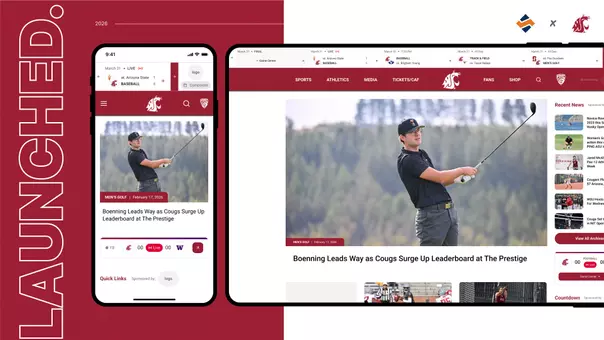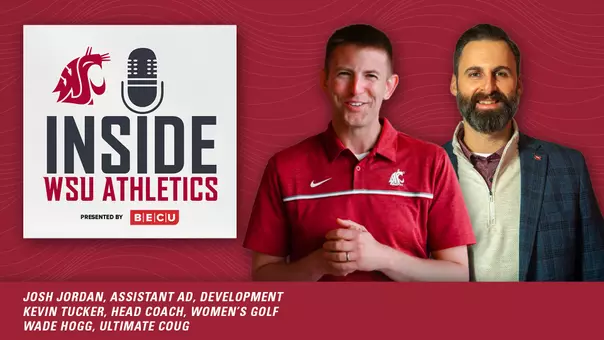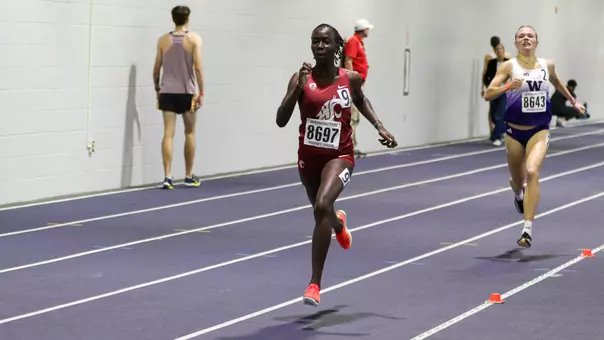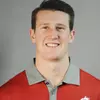Washington State University Athletics
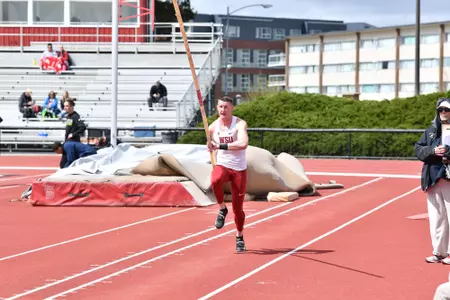
Dedicated to School, Sports, and the Military
November 09, 2019 | WSU Athletics, Track & Field, Cougar Athletic Fund
Editor's Note: For more information about the WSU ROTC program, please visit rotc.wsu.edu. To learn more about the WSU Department of History, please visit history.wsu.edu
Wayne Phipps sits at his desk and contemplates what to say about Troy Gingerich.
"If you have that checklist of all the things you want from your student-athletes, he checks everything," the Director of Washington State Cross Country/Track & Field said. "He's extremely coachable, extremely respectful, mindful, and polite. He is a really good teammate who is supportive of everything the team does."
And then, after pausing for a moment, Phipps said:
"I'm running out of superlatives to say."
Professor of Military Science Lieutenant Colonel Brendan Hobbs learned of Gingerich's story at a Cougar basketball game.
It happened to be the game when the Athletic Department recognized student-athletes who excelled in academics at halftime.
"Troy walks out and I said, 'He's one of mine,'" Hobbs remembered. "History major, pole vaulter. I need to pay attention to him."
Dr. Raymond Sun, an Associate Professor in the WSU Department of History, remembers his first encounter with Gingerich.
"He was a quiet guy until we started to have class discussions," said Sun. "What he had to say showed he had done the reading and had thought about it. That immediately got my attention."
Gingerich, now a senior at WSU, devotes his attention to track and field as a pole-vaulter, earning a Pac-12 First Team All-Academic selection as a history major, and a peer leader in the WSU ROTC (Senior Reserve Officers' Training Corps) program, who directs its morning physical training sessions.
He has a specific term to illustrate his passions.
Glass balls.
"You have it in your life and you can't drop it," Gingerich explained about the term's meaning, taking a rare break from his busy schedule to talk.
For Gingerich, the glass balls that he couldn't drop were military service, sports, and academics.
And those were three things he looked for in a college to attend while a senior at Reed High School in Sparks, Nevada.
"I was looking at all schools on the west coast that had good programs for sports, but also a good ROTC program, and a good major that fit my interest," Gingerich said. "WSU was the only school in the west that fit directly what I wanted to do."
Military Service
Gingerich said his interest in serving in the military has "always been something I wanted to do."
"All the aspects I grew up with matched up so well with the military," he continued. "I knew that in an early stage of my life that was going to be me."
While the WSU ROTC Program is open to any freshman and sophomore, Gingerich secured his place in the WSU ROTC by earning an Army ROTC Scholarship.
He was a sophomore when he caught Hobbs' eye at the Cougar Basketball game.
"The instructor said he does great PT, shows up to everything, and has volunteered for additional training," Hobbs said.
So impressed with what he learned about and saw from Gingerich, Hobbs sent him to Army School in Fort Jackson, South Carolina, with the purpose to be a Master Fitness Trainer.
"He plans all physical training for the whole battalion," Hobbs said, which he said comprises 140 cadets.
And that training is aimed to achieve a specific purpose for Hobbs.
"I'm trying to make the next generation of officers of character for the United States Army," Hobbs explained. "I'm trying to build ethical moral leaders who can lead American soldiers in a dynamic complex environment anywhere in the world."
The physical training, commonly referred to as PT, is held during the early mornings at 5:30 a.m. on Mondays, Wednesdays and Fridays at Hollingbery Fieldhouse and Mooberry Track.
The early start time means Gingerich arrives on campus even earlier to make sure everything is set up for the PT session.
While Phipps sees Gingerich during the afternoon track practice he sees his work much earlier in the day, too.
"We have cross country practice pretty early in the morning but there's rarely a day, even on our earliest day, when we show up that we beat the ROTC," Phipps said. "I look over and we're about to load into the vans to Colfax, and there is the ROTC running around the track."
 The PT consists of a variety of tasks that Gingerich plans for well in advance, as much as two to four weeks out. The tasks can include: marching, training to run two miles in under 15 minutes, speed work, strength training, and, as Hobbs describes, real world type fitness skills, such as lifting a 100-pound shell over a shoulders onto a truck.
The PT consists of a variety of tasks that Gingerich plans for well in advance, as much as two to four weeks out. The tasks can include: marching, training to run two miles in under 15 minutes, speed work, strength training, and, as Hobbs describes, real world type fitness skills, such as lifting a 100-pound shell over a shoulders onto a truck.
"Troy has the ability to see past the immediate requirement and have a vision for not only what he needs to do for himself but what his organization needs to do," Hobbs said. "A lot of that comes from being an athlete. Having to know that you are producing or trying to get to a set goal and what it takes to get there."
Academics
"I love military history, specifically World War II," Gingerich said. "I never really thought history was going to influence me in other parts of my life."
It was Sun who demonstrated how military history will play a significant role in Gingerich's future.
At a seminar class Sun taught, students were required to conduct and independent research project.
"The general topic of the seminar was the United States experience in World War I," Sun recalled. "Students could pick any topic they wanted. Troy wanted to write a paper about officers in the first World War."
To assist in his efforts, Sun showed Troy the book, "Five Lieutenants" a story about five Harvard university students who volunteered to join the American Forces in 1917 to fight in World War I.
"I started him on that book because it gives a very vivid description of the steep learning curve American soldiers and officers in general had to do because this was a new style of warfare," said Sun. "He identified with it."
Beyond the book, Gingerich conducted independent research for his paper. He contacted the Army War College in Carlisle, Pennsylvania to acquire additional content.
"For a student just starting his major I thought that was remarkable," said Sun. "It stuck out to me."
Gingerich said Dr. Sun was able to highlight for him that the lessons he learns in class about officers' experiences he will be able to apply during his career as an officer.
"Ever since, history has changed for me," Gingerich said.
"I believe it's important that people come to respect the power of history in shaping the present, and by extrapolation, the future," said Sun.
"I think for future officers like Troy, who may well be grappling with cultures and conditions very foreign to their personal experiences, being able to draw on such knowledge, or having the skills to acquire such knowledge, will be crucial in helping them to become future leaders and decision-makers," said Sun.
Sports
"I think it's the competitive nature," Gingerich says of his love of sports. "It's probably cliché because every athlete at WSU will tell you the same thing."
Gingrich was a versatile athlete at Reed High School earning seven varsity letters in football, alpine ski racing, and track and field with a specialty in pole vault.
It was pole vault he continued when arriving to WSU as a walk-on to the track and field team.
"From the very beginning, every interaction with Troy was very professional, very respectful and very polite," Phipps remembered of his first encounter with Gingerich.
"I thought this guy is going to be a great addition to the team," added Phipps.
 And what is it about pole vault that appeals to Gingerich?
And what is it about pole vault that appeals to Gingerich?
"Getting inverted is super thrilling," he said with a smile. "It grows on you."
"He's performed at a very high level," said Phipps.
"Being an athlete here is something you can't get anywhere else," Gingerich said. "In sports, there is nowhere else you can find everyone going down the same path. You are in a room surrounded by people who are all going toward the same objective. That is hard to find."
Dropping a Ball? Never.
Gingerich is the only NCAA athlete at WSU in the ROTC, said Hobbs, who explained NCAA athletes are rare in ROTC because of the demands on their time.
"When I talk to him and I see what his schedule is like I don't think he's got a lot of time for leisure activities," Hobbs said. "I'm sure most of his waking hours are spent devoting time to one of those three glass balls."
With the time demands the ROTC, track and field, and academics require, it would be easy to think how simple it would be for Gingerich to drop one of those glass balls.
Gingerich remembered his freshman and sophomore years, which he described as "my hardest two years at WSU."
"My days were crazy back then," he said.
"I had the ROTC schedule, was new to the track team, new to classes and taking 19 credits," Gingerich said. "I would go to PT, straight to class, track workout, go back to Army lab or class, and then go back for weight training."
It got so busy for Gingerich that he didn't have time to change.
"Sometimes I would come to the weight room with camo paint face on."
The time demands forced Gingerich to ask some hard questions: "I can tell you a point every year in college, I have so much on my plate am I doing everything I can to help myself? "At the worst of your times, I go home at night and ask what am I doing?
It was the support system athletics provided that provided him relief.
"It's something about the competition for me that will get me back up on my feet and keep pushing forward," Gingerich said. "The amount of stuff WSU does for athletes is something people appreciate but, for someone like me whose days never stop, there is no way I would be able to do it without having athletics.
"Quitting, I can't. I love it that much."
The Future
"Troy is dedicated to school, dedicated to his sport, and dedicated to his military commitment," said Phipps.
And as his schooling and sport at WSU nears its completion, Gingerich turns his attention toward life after WSU and his military commitment.
Gingerich had a choice of preference about where he wanted to serve when his time at WSU is complete: active duty, national guard or reserves.
He chose active duty with the goal of becoming an Army Ranger officer.
 "For me, it's the best way I can serve," he explained.
"For me, it's the best way I can serve," he explained.
Gingerich earned a designation of a Distinguished Military Graduate, those who rank in the top 20 percent of Army ROTC graduates nationwide.
"It is quite an achievement for him," said Hobbs.
Gingerich will be commissioned then will have further schooling to become an infantry officer.
"It would be infantry basic officer leadership course," Gingerich explained. "Everything you do you would have to be an officer for infantry. After that I'm hoping to go to Ranger school."
As his time at WSU draws to an end, one thing is for sure for Gingerich's experiences and the knowledge he gained the past four years at WSU has shaped him for the future.
"Troy has profited with the way he invested his energy during his four years here," Hobbs said. "He's got unlimited potential to serve any level the Army trains him for and he has experience at. He is presenting himself and aware of things that somebody six to eight years senior to him is aware of."
"I'd love to sit down with Troy in five to 10 years, just have lunch with him, and see where's he at," Sun said. "How he's thinking, what he's learned and what his sights are for his next set of goals. He is always going to be wanting to grow. I love to see how he progresses after WSU."
Wayne Phipps sits at his desk and contemplates what to say about Troy Gingerich.
"If you have that checklist of all the things you want from your student-athletes, he checks everything," the Director of Washington State Cross Country/Track & Field said. "He's extremely coachable, extremely respectful, mindful, and polite. He is a really good teammate who is supportive of everything the team does."
And then, after pausing for a moment, Phipps said:
"I'm running out of superlatives to say."
Professor of Military Science Lieutenant Colonel Brendan Hobbs learned of Gingerich's story at a Cougar basketball game.
It happened to be the game when the Athletic Department recognized student-athletes who excelled in academics at halftime.
"Troy walks out and I said, 'He's one of mine,'" Hobbs remembered. "History major, pole vaulter. I need to pay attention to him."
Dr. Raymond Sun, an Associate Professor in the WSU Department of History, remembers his first encounter with Gingerich.
"He was a quiet guy until we started to have class discussions," said Sun. "What he had to say showed he had done the reading and had thought about it. That immediately got my attention."
Gingerich, now a senior at WSU, devotes his attention to track and field as a pole-vaulter, earning a Pac-12 First Team All-Academic selection as a history major, and a peer leader in the WSU ROTC (Senior Reserve Officers' Training Corps) program, who directs its morning physical training sessions.
He has a specific term to illustrate his passions.
Glass balls.
"You have it in your life and you can't drop it," Gingerich explained about the term's meaning, taking a rare break from his busy schedule to talk.
For Gingerich, the glass balls that he couldn't drop were military service, sports, and academics.
And those were three things he looked for in a college to attend while a senior at Reed High School in Sparks, Nevada.

"I was looking at all schools on the west coast that had good programs for sports, but also a good ROTC program, and a good major that fit my interest," Gingerich said. "WSU was the only school in the west that fit directly what I wanted to do."
Military Service
Gingerich said his interest in serving in the military has "always been something I wanted to do."
"All the aspects I grew up with matched up so well with the military," he continued. "I knew that in an early stage of my life that was going to be me."
While the WSU ROTC Program is open to any freshman and sophomore, Gingerich secured his place in the WSU ROTC by earning an Army ROTC Scholarship.
He was a sophomore when he caught Hobbs' eye at the Cougar Basketball game.
"The instructor said he does great PT, shows up to everything, and has volunteered for additional training," Hobbs said.
So impressed with what he learned about and saw from Gingerich, Hobbs sent him to Army School in Fort Jackson, South Carolina, with the purpose to be a Master Fitness Trainer.
"He plans all physical training for the whole battalion," Hobbs said, which he said comprises 140 cadets.
And that training is aimed to achieve a specific purpose for Hobbs.
"I'm trying to make the next generation of officers of character for the United States Army," Hobbs explained. "I'm trying to build ethical moral leaders who can lead American soldiers in a dynamic complex environment anywhere in the world."
The physical training, commonly referred to as PT, is held during the early mornings at 5:30 a.m. on Mondays, Wednesdays and Fridays at Hollingbery Fieldhouse and Mooberry Track.
The early start time means Gingerich arrives on campus even earlier to make sure everything is set up for the PT session.
While Phipps sees Gingerich during the afternoon track practice he sees his work much earlier in the day, too.
"We have cross country practice pretty early in the morning but there's rarely a day, even on our earliest day, when we show up that we beat the ROTC," Phipps said. "I look over and we're about to load into the vans to Colfax, and there is the ROTC running around the track."
 The PT consists of a variety of tasks that Gingerich plans for well in advance, as much as two to four weeks out. The tasks can include: marching, training to run two miles in under 15 minutes, speed work, strength training, and, as Hobbs describes, real world type fitness skills, such as lifting a 100-pound shell over a shoulders onto a truck.
The PT consists of a variety of tasks that Gingerich plans for well in advance, as much as two to four weeks out. The tasks can include: marching, training to run two miles in under 15 minutes, speed work, strength training, and, as Hobbs describes, real world type fitness skills, such as lifting a 100-pound shell over a shoulders onto a truck. "Troy has the ability to see past the immediate requirement and have a vision for not only what he needs to do for himself but what his organization needs to do," Hobbs said. "A lot of that comes from being an athlete. Having to know that you are producing or trying to get to a set goal and what it takes to get there."
Academics
"I love military history, specifically World War II," Gingerich said. "I never really thought history was going to influence me in other parts of my life."
It was Sun who demonstrated how military history will play a significant role in Gingerich's future.
At a seminar class Sun taught, students were required to conduct and independent research project.
"The general topic of the seminar was the United States experience in World War I," Sun recalled. "Students could pick any topic they wanted. Troy wanted to write a paper about officers in the first World War."
To assist in his efforts, Sun showed Troy the book, "Five Lieutenants" a story about five Harvard university students who volunteered to join the American Forces in 1917 to fight in World War I.
"I started him on that book because it gives a very vivid description of the steep learning curve American soldiers and officers in general had to do because this was a new style of warfare," said Sun. "He identified with it."
Beyond the book, Gingerich conducted independent research for his paper. He contacted the Army War College in Carlisle, Pennsylvania to acquire additional content.
"For a student just starting his major I thought that was remarkable," said Sun. "It stuck out to me."
Gingerich said Dr. Sun was able to highlight for him that the lessons he learns in class about officers' experiences he will be able to apply during his career as an officer.
"Ever since, history has changed for me," Gingerich said.
"I believe it's important that people come to respect the power of history in shaping the present, and by extrapolation, the future," said Sun.
"I think for future officers like Troy, who may well be grappling with cultures and conditions very foreign to their personal experiences, being able to draw on such knowledge, or having the skills to acquire such knowledge, will be crucial in helping them to become future leaders and decision-makers," said Sun.
Sports
"I think it's the competitive nature," Gingerich says of his love of sports. "It's probably cliché because every athlete at WSU will tell you the same thing."
Gingrich was a versatile athlete at Reed High School earning seven varsity letters in football, alpine ski racing, and track and field with a specialty in pole vault.
It was pole vault he continued when arriving to WSU as a walk-on to the track and field team.
"From the very beginning, every interaction with Troy was very professional, very respectful and very polite," Phipps remembered of his first encounter with Gingerich.
"I thought this guy is going to be a great addition to the team," added Phipps.
 And what is it about pole vault that appeals to Gingerich?
And what is it about pole vault that appeals to Gingerich?"Getting inverted is super thrilling," he said with a smile. "It grows on you."
"He's performed at a very high level," said Phipps.
"Being an athlete here is something you can't get anywhere else," Gingerich said. "In sports, there is nowhere else you can find everyone going down the same path. You are in a room surrounded by people who are all going toward the same objective. That is hard to find."
Dropping a Ball? Never.
Gingerich is the only NCAA athlete at WSU in the ROTC, said Hobbs, who explained NCAA athletes are rare in ROTC because of the demands on their time.
"When I talk to him and I see what his schedule is like I don't think he's got a lot of time for leisure activities," Hobbs said. "I'm sure most of his waking hours are spent devoting time to one of those three glass balls."
With the time demands the ROTC, track and field, and academics require, it would be easy to think how simple it would be for Gingerich to drop one of those glass balls.
Gingerich remembered his freshman and sophomore years, which he described as "my hardest two years at WSU."
"My days were crazy back then," he said.
"I had the ROTC schedule, was new to the track team, new to classes and taking 19 credits," Gingerich said. "I would go to PT, straight to class, track workout, go back to Army lab or class, and then go back for weight training."
It got so busy for Gingerich that he didn't have time to change.
"Sometimes I would come to the weight room with camo paint face on."
The time demands forced Gingerich to ask some hard questions: "I can tell you a point every year in college, I have so much on my plate am I doing everything I can to help myself? "At the worst of your times, I go home at night and ask what am I doing?
It was the support system athletics provided that provided him relief.
"It's something about the competition for me that will get me back up on my feet and keep pushing forward," Gingerich said. "The amount of stuff WSU does for athletes is something people appreciate but, for someone like me whose days never stop, there is no way I would be able to do it without having athletics.
"Quitting, I can't. I love it that much."
The Future
"Troy is dedicated to school, dedicated to his sport, and dedicated to his military commitment," said Phipps.
And as his schooling and sport at WSU nears its completion, Gingerich turns his attention toward life after WSU and his military commitment.
Gingerich had a choice of preference about where he wanted to serve when his time at WSU is complete: active duty, national guard or reserves.
He chose active duty with the goal of becoming an Army Ranger officer.
 "For me, it's the best way I can serve," he explained.
"For me, it's the best way I can serve," he explained.Gingerich earned a designation of a Distinguished Military Graduate, those who rank in the top 20 percent of Army ROTC graduates nationwide.
"It is quite an achievement for him," said Hobbs.
Gingerich will be commissioned then will have further schooling to become an infantry officer.
"It would be infantry basic officer leadership course," Gingerich explained. "Everything you do you would have to be an officer for infantry. After that I'm hoping to go to Ranger school."
As his time at WSU draws to an end, one thing is for sure for Gingerich's experiences and the knowledge he gained the past four years at WSU has shaped him for the future.
"Troy has profited with the way he invested his energy during his four years here," Hobbs said. "He's got unlimited potential to serve any level the Army trains him for and he has experience at. He is presenting himself and aware of things that somebody six to eight years senior to him is aware of."
"I'd love to sit down with Troy in five to 10 years, just have lunch with him, and see where's he at," Sun said. "How he's thinking, what he's learned and what his sights are for his next set of goals. He is always going to be wanting to grow. I love to see how he progresses after WSU."
Players Mentioned
Wayne Phipps Press Conference 5/9
Wednesday, May 09
Wayne Phipps Press Conference 5/2
Wednesday, May 02
Highlights: WSU vs. UW
Monday, April 30
Cougs Victorious Over Huskies!
Monday, April 30










